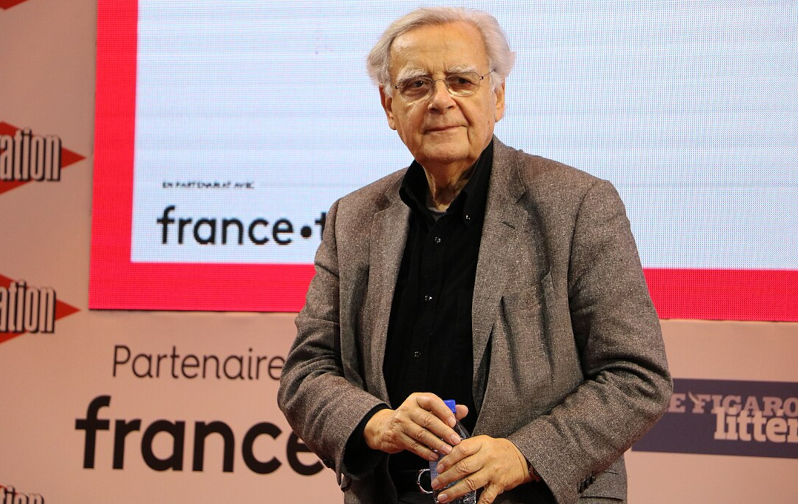Book hero dies
May 19, 2024
A hero of mine has died. Bernard Pivot, who did more than any other French journalist to get people to read, on Monday (6 May) joined the extinct writers he loved. A TV presenter and producer, he was 89.
Apostrophes, his weekly talk show about books, regularly drew six million viewers an episode. During its run from 1975 to 1990 Pivot interviewed elite writers such as Vladimir Nabokov, Susan Sontag, Norman Mailer, Georges Simenon and Tom Wolfe. Many were the intellectuals, politicians, actors and filmmakers who were delighted to be invited to sit around Pivot’s low coffee table piled high with tomes to talk about literature. Among them were the Dalai Lama, François Mitterrand, Jean-Luc Godard and Roman Polanski. No book, no subject was too controversial.
I loved Apostrophes so much that in the mid-1980s I thought Australian television deserved something similar.
Somehow or other I met an ABC producer and convinced him that we should try to get it up. There is no record online of either our program or the producer’s name, which I think was Noel Turnbull, a common enough moniker and not the former editor of Farrago, Melbourne Uni’s student paper, and notable PR man.
Noel, the ABC producer, and I discussed for many hours over white coffees – it was the 1980s and lattes were fewer then – how we would go about getting the show approved. He was quite pessimistic.
I told him about Pivot’s program, that it was hugely popular, that he had gone from being the son of a grocer to a thinking person’s TV star. Despite the intellectual gravitas of many of his guests, Pivot held firmly the show’s tiller and steered a course well clear of the esoteric and pretentious.
Noel thought the model wouldn’t work in Australia. And who was the anchor person going to be? Er, Mr Turnbull, I mumbled, shooting up my hand. He wouldn’t buy it, and, after all, he was the man with the ABC’s ears. He would ultimately have to take it to executives.
Initially they couldn’t see the point of such a show. Too exclusive. Too highbrow. Who would watch? Noel told me we had to be more convincing. Go and see Melbourne’s publishers and get their support.
Most notably I had meetings with Di Gribble and Hilary McPhee at the legendary McPhee Gribble (think Tim Winton, Helen Garner and others) and Peter Ryan at Melbourne University Publishing. Both houses sent me very encouraging support letters, which I took to Noel.
I was a salaried feature writer at The Age in those days, and unfortunately Peter Ryan was a close friend of the paper’s editor Creighton Burns. He told Burns about the meeting, which was around a crackling open fire at Ryan’s office and had been nothing if not long and genial. Burns immediately hauled me in to rip me to shreds. On one occasion at least my feature writing had reduced him to tears (The day Aireys burned), but he was ferociously displeased that I had had a meeting about an ABC TV show on Age time. (Time was more elastic in those days. On some you put in a dozen hours, on others very little.)
ABC executives eventually greenlit the program, and I’m not sure now whether it was called The Book Show or The Book Program. (You will find nothing about it online.) Noel insisted that it be segmented and that I be listed as an associate producer. We found an irascible, book-loving anchorman, Dinny O’Hearn, who was sub-dean of arts at Melbourne University and loved his Jameson Irish whisky. (Because of my restaurant reviewing, he called me ‘béarnaise Downes’.)
Our show ran for two – or was it three? – seasons, my involvement lessening. (I did at least one interview for it – with ‘Weary’ Dunlop about his war diaries, which had just come out.) It was serious, though, thoughtful, and covered books and arguments in an approachable way. It wasn’t Pivot, but it approximated.
There has been a more recent ABC TV book program, The Book Club, which ran for several seasons until 2017. But how valuable would it be these days to stage another book show? At a time when grown-ups are reading less and children can’t? When most books for adults are bedtime stories and romances? When men no longer read?
Surely, it’s an impossibility, and Bernard Pivot’s massive legacy in a country much more intellectually inclined than Australia, and Noel Turnbull’s and mine in Australia, have evaporated.
At the Bali resort where I’m staying for a few days they have French TV. Two days after Pivot’s death, a roundtable of notable writers, actors and publishers are discussing his grand contribution to Gallic culture. It wouldn’t happen in Australia.
